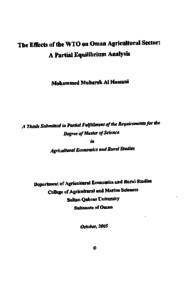Document
The effects of the WTO on Oman agricultural sector : a partial equilibrium analysis
Publisher
Sultan Qaboos University
Gregorian
2005
Language
English
English abstract
Upon accession to the WTO, Oman made certain commitments to liberalize its trading policy in the agriculture sector as well as in the economy as whole. Those commitments are expected to expand after the implementation of the WTO built-in agenda, which is concerned with multilateral negotiations to liberalize trade in agriculture. Moreover, the WTO is negotiating further multilateral trade liberalization covering world trade in all the goods.
This study assesses the trade and welfare impacts of agricultural trade liberalization within the context of both unilateral and WTO multilateral trade liberalization. The analysis focuses on the agricultural sector specific effects as well as on the economy-wide effects, which are reflected in the exchange rate, balance of payment and economic welfare changes. The assessment of those effects on the agricultural sector in Oman is undertaken using a partial equilibrium model derived from the World Trade Simulation Model. The model is based on GAMS (General Algebraic Modeling System) to solve for the equilibrium prices and values of trades. The import and export trade data was obtained from the UN Commodity Trade Statistic Database (Comtrade) using the Standard International Trade Product Classification, Revision 3 (SITC,Rev.3) while the import tariff rate was compiled from the UN Conference on Trade and development (UNCTAD-TRAINS) database.
The study concludes that under all the trade liberalization policy options simulated in this research, the economic gains for Oman in terms of trade and economic welfare will improve. However, multilateral trade liberalization covering all the goods offers the greatest benefit to the economy. Also, the study finds that changes in economic welfare in Oman are much higher under a liberalization process covering all sectors rather than liberalization covering only the agriculture sector. Moreover, examining the effects of trade liberalization on domestic prices for import of individual agricultural product reveals that the price of basic foodstuffs will increase.
Member of
Resource URL
Arabic abstract
صاحب انضمام سلطنة عمان لمنظمة التجارة العالمية بعض الالتزامات فيما يخص تحرير التجارة في القطاع الزراعي بشكل خاص وفي بقية القطاعات الاقتصادية بشكل عام ومن المتوقع ان تتوسع تلك الالتزامات من خلال المفاوضات التي تقوم بها منظمة التجارة العالمية في الوقت الحالي والتي تهدف في النهاية إلى تحرير التجارة في القطاعات الاقتصادية بشكل عام وفي القطاع الزراعي بشكل خاص. وتهدف هذه الدراسة إلى معرفة مدى التأثير الذي ستلحقه عملية تحرير التجارة على القطاع الزراعي بسلطنة عمان وكذلك على بقية القطاعات الاقتصادية إما من خلال إزالة القيود الجمركية وغير الجمركية من الجانب العماني أو من خلال المفاوضات التي تقوم بها منظمة التجارة العالمية. وستتم الدراسة عن طريق عملية محاكاه باستخدام نموذج التوازن الجزئي بوضع سيناريوهات مختلفة لعملية تحرير التجارة مستعينا في ذلك ببرنامج يسمى جمس (GAMS). للحصول على النتائج المتوقعة من عملية تحرير التجارة وفقالسيناريوهات المتوقعة. و أظهرت نتائج الدراسة بان تحرير التجارة بشكل عام سيؤدي إلى زيادة حجم التبادل التجاري و سيعود ذلك بشكل إيجابي على الاقتصاد العماني. إلا إن التأثير الإيجابي لعملية تحرير التجارة عن طريق المفاوضات التي تنظمها منظمة التجارة العالمية في جميع القطاعات الاقتصادية (جميع المنتجات والسلع) هي التي ستسفر عن أكبر المكاسب للاقتصاد العماني. كذلك أظهرت نتائج الدراسة إن عملية تحرير التجارة عندما تشمل كافة السلع تسفر عن مكاسب اقتصادية اكثر من المكاسب المتوقعة عندما يكون تحرير التجارة مقتصرا على المنتجات الزراعية. كذلك أظهرت عملية المحاكاه أن أسعار المواد الغذائية الأساسية للمستهلكين سوف ترتفع كنتيجة لعملية تحرير التجارة.
Category
Theses and Dissertations

